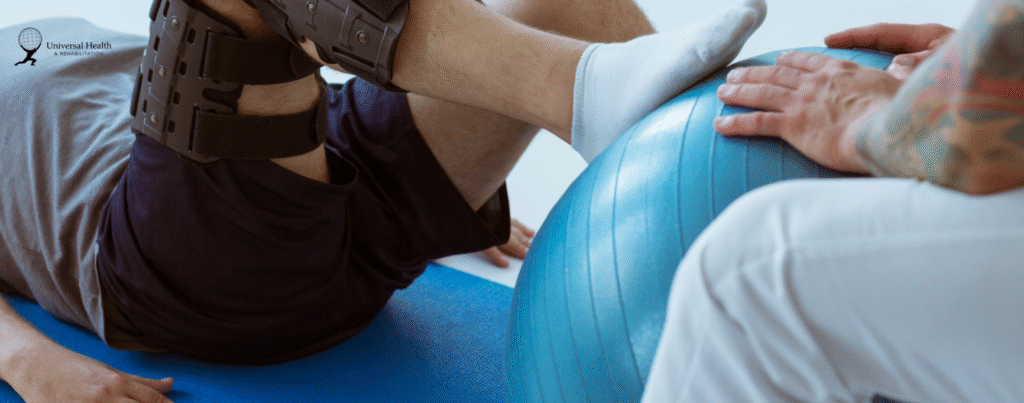When an injury disrupts your daily routine, the path to recovery often feels uncertain. Physical therapy provides structure, guidance, and proven techniques that help restore movement and reduce pain. At Universal Health and Rehabilitation, physical therapy is more than a set of exercises; it’s a patient-centered process designed to rebuild confidence and improve quality of life.
Why Physical Therapy Matters After an Injury
After an accident, surgery, or sports-related strain, the body needs time and support to heal. Without proper care, muscles can weaken, joints may stiffen, and scar tissue can limit mobility. Physical therapy addresses these challenges directly by restoring function through targeted movement, hands-on techniques, and education.
What sets physical therapy apart is its dual focus: relieving immediate discomfort while also preventing long-term complications. By working with a licensed therapist, patients can reduce the risk of reinjury, improve balance, and build resilience for future activity.
What to Expect During Your First Visit
The first session is all about understanding your unique situation. A therapist will assess the type of injury, review your medical history, and listen to your goals. At Universal Health and Rehabilitation, this assessment forms the foundation of a personalized care plan.
Expect simple movement tests, strength checks, and posture analysis. These insights guide the therapist in choosing safe, effective exercises and techniques. From the start, the emphasis is on collaboration, you and your therapist work together to define realistic milestones.
Techniques Used in Post-Injury Physical Therapy
Physical therapy is not one-size-fits-all. Depending on your condition, your treatment plan may include:
- Manual therapy: Hands-on techniques to reduce stiffness and improve joint mobility.
- Therapeutic exercises: Guided movements that strengthen muscles and restore flexibility.
- Neuromuscular re-education: Activities that retrain the nervous system for coordination and balance.
- Modalities for pain relief: Techniques such as heat, ice, or electrical stimulation to support healing.
At Universal Health and Rehabilitation, these therapies often integrate with other services like chiropractic care or massage therapy, creating a comprehensive approach that addresses both symptoms and root causes.
The Patient’s Role in Recovery
While a therapist provides expertise and guidance, recovery also depends on patient participation. Consistency matters: showing up to appointments, practicing home exercises, and following lifestyle recommendations all contribute to better outcomes. Patients who stay engaged often notice progress faster, whether that means walking without pain, returning to work, or resuming sports.
Benefits Beyond Healing
Physical therapy doesn’t just restore the body after an injury; it also equips patients with tools for long-term wellness. Improved posture, better movement patterns, and enhanced strength all carry over into everyday life. Many patients find that they move more confidently and feel more resilient even after therapy ends.
At Universal Health and Rehabilitation, therapists see recovery as a journey. Each visit builds on the last, helping patients transition from pain to performance and eventually to prevention.
Looking Ahead: What to Expect Over Time
The length of recovery varies depending on the severity of the injury and individual factors like age, fitness level, and overall health. Some people see improvement in a few weeks, while others may require months of dedicated therapy. What remains constant is the goal: restoring independence and ensuring patients can return to the activities they value most.
Final Thoughts
Post-injury recovery can be overwhelming, but with the right guidance, it becomes a structured and hopeful process. Physical therapy provides a roadmap for healing, supported by science and compassion. At Universal Health and Rehabilitation, patients don’t just receive treatment they gain a partner committed to their recovery and long-term well-being.


